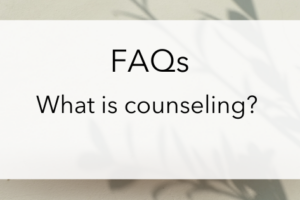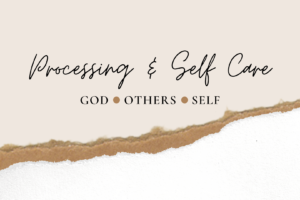Going to therapy is one of the bravest things we will ever do because being vulnerable and telling someone what you are going through is hard and scary. We are taught so often in western culture to take care of ourselves and to keep fighting, to keep pushing through. In her book, Try Softer, Aundi Kolber calls it “white-knuckling.”
There is still a stigma on mental health. However, our culture is beginning to see the value of slowing down, of noticing and listening to our bodies and emotions, of paying closer attention to what’s going on around us and within us, of getting professional help. Even so, we still have a hard time knowing when we need help. We get to a place where we can’t white-knuckle our way though our pain, trauma, or mental health issues alone anymore.
So how do we know we even need professional help? And further, how do we admit we need it, especially when expressing our needs feels so foreign?
I’m going to answer these questions in two parts. First, it’s important to see that not every person may be in need of professional counseling. I encourage people to be honest with God about how they’re doing, then if through prayer, things aren’t getting better, tell a close friend or loved one. This needs to be a safe person, someone you trust wholeheartedly. If that isn’t helping, you could even try talking with your pastor if you have one or a leader within your local church. This isn’t some magic recipe to being able to overcome your struggles and issues, but it could help. If it’s not helping in the way you need, I would say it’s definitely time to seek out a professional counselor.
Then it’s important to think about the problem itself and who is involved? Will you need to go to therapy alone or will another need to join you?
Here are some indicators you may need to go to therapy. This is not an exhaustive list, and some come from responses to this question on Full Life’s Facebook page. However, this is a good place to start.
When should you consider counseling?
- You are sleeping more or less than usual and/or have a hard time falling or staying asleep.
- You have little interest or pleasure in doing things.
- You feel more irritated or easily angered than usual.
- You experience high levels of panic or have panic attacks.
- You worry excessively and/or avoid situations where you feel anxious.
- You have recurrent thoughts of death or ending your life.
- You experience “high highs and low lows.”
- You have hurt yourself.
- You are using substances excessively.
- You have negative thinking pattens that won’t go away.
- Your relationships are toxic, unhealthy, or broken.
- You have little motivation to do anything.
- You’ve experienced any traumatic events that aren’t resolved, or are still affecting you in harmful ways.
- You feel hopeless, purposeless, and confused about what’s next in your life.
- You want to know more about how you got here (the current problematic situation) and how to move forward.
- You’re having difficulty setting boundaries and using your voice.
- You have unexplained aches and pains in your body.
- You feel your emotions are “out of control.”
- You feel detached, numb, or distant from yourself and your surroundings
- You are struggling to understand and communicate what you are experiencing.
- When today’s experiences trigger the same difficult emotions from hard past experiences.
- You’re feeling run by your life rather than you’re running your life.
- You keep doing the same thing over and over again and you don’t know why.
What holds us back from going to counseling?
- Cultural (and sometimes religious) stigmas
- Lack of time or resources
- Fear, anxiety, or uncertainty
- Lack of trust in a stranger
- “It has to stay within the family.”
- Lack of motivation to change
- “I can take care of myself.”
- “Only crazy people go to counseling.”
- Low self-worth, not believing your needs matter that much
We could probably think of so many more here, and the point is not to make anyone feel embarrassed or ashamed if you’ve experienced any of the aforementioned issues. The point is for us all to link arms, admit we all need help from time to time, and allow ourselves to be vulnerable enough to get it.
We can’t live or love well if we aren’t well.
We can’t operate at a functioning capacity, either. God values each of us deeply, so let’s value ourselves that way, too, and honor our needs. If we need professional counseling, let’s begin to accept and acknowledge that so we can all move toward healing and wholeness. Together.
If you are in need of counseling, don’t hesitate to reach out to us at Full Life Christian Counseling. We know it’s scary, but we believe the rewards outweigh the risks. We’d be honored to walk with you on your healing journey. You can reach us on our contact page or call 504.635.7162 for more information or to set up an appointment. We look forward to meeting you and hearing your story.





Recent Comments